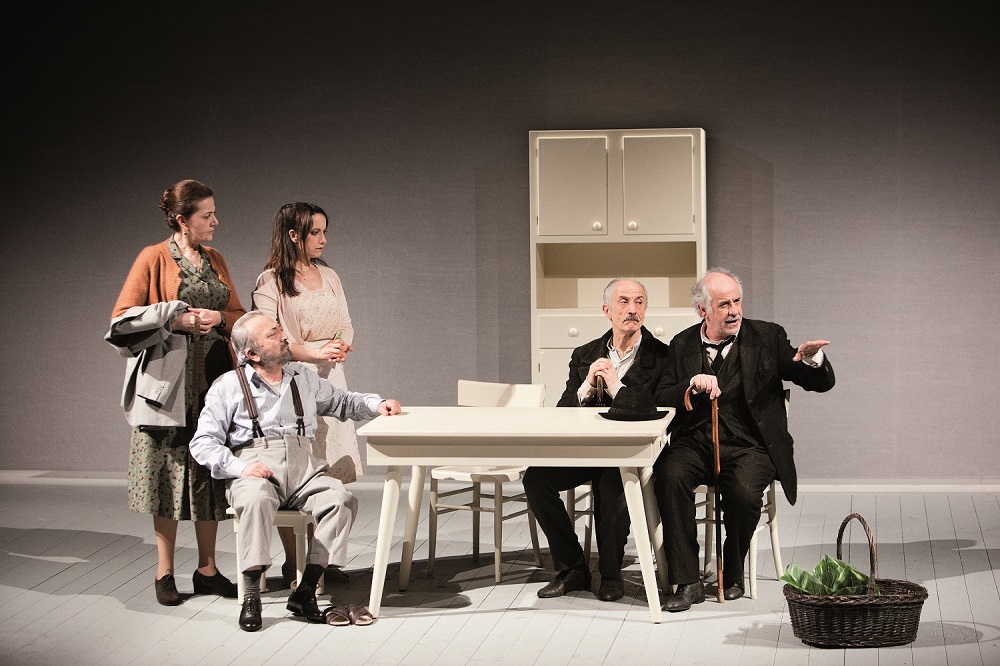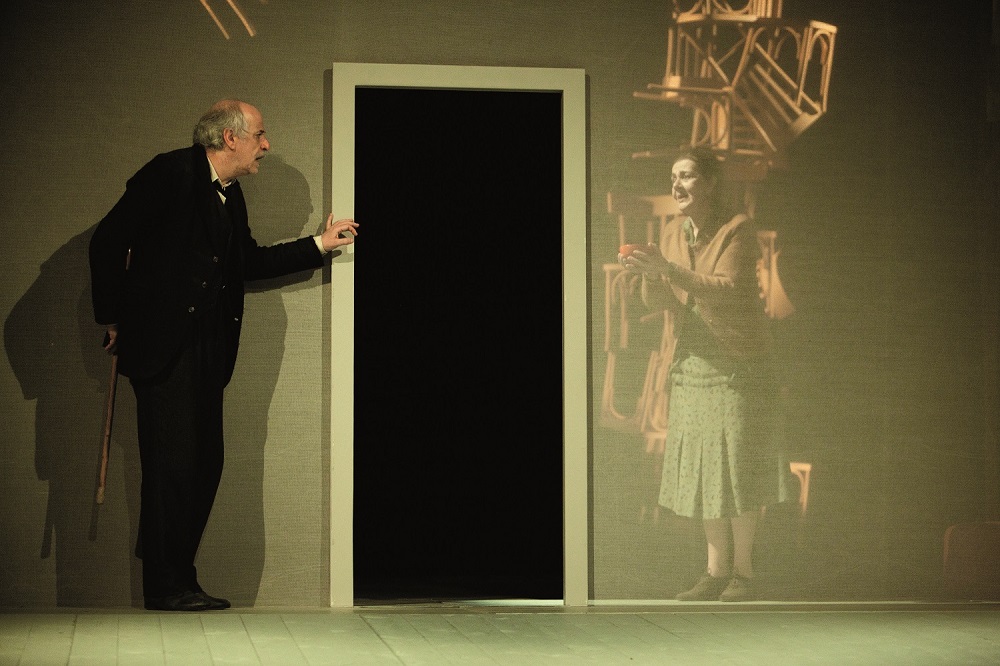We’ve now learned from the films of Paolo Sorrentino and honorary Roman Ferzan Ozpetek what great and nuanced ensemble acting the Italians can produce. Even so, the towering star of the current scene is the chameleonic Toni Servillo, already hailed as seemingly impassive capo di tutti capi Andreotti in Il Divo and as the (Oscar-winning) regretful playboy Jep Gambardella in the stupendous La grande bellezza (The Great Beauty).
Servillo is, in fact, a stage animal of longer standing with feet firmly planted on thespian ground as actor/director, a Neapolitan to the core and as such the natural successor, as genius impresario, to the author of Inner Voices (Le voci di dentro) Eduardo De Filippo. Here he dominates only because that’s the nature of his catalytic character, a neurasthenic neighbour who unravels everyone’s darker side in a Naples apartment block; but his team of fellow actors also have faces and body shapes most companies can only dream about (below, a scene from Act One, the Servillo brothers on the right).
Theatregoers with long memories may remember Joan Plowright and Ralph Richardson as beacons of the De Filippo renaissance in Britain, though there’s nothing like seeing his plays in the original, saturated in the most musical of dialects. On screen, we can still be dazzled by Sophia Loren, cutting so much more than just a bella figura, and Marcello Mastroianni as three sets of lovers giving us a Hepburn and Tracey double-act with added sex appeal in Ieri, oggi e domani (Yesterday, Today and Tomorrow). 
Inner Voices goes deeper, using the tool of a star role to show the impact of dream on reality. And what a dream: Alberto Saporito, who lives with his even seedier brother Carlo and a misanthropic uncle who communicates only by letting off fireworks, is convinced his neighbours have committed a murder (no real plot spoiler here, though De Filippo’s playfulness in delaying the accusation gives Servillo fabulous preamble opportunities which he takes with aplomb). He may only have imagined it, but the charge unleashes further recriminations between the unlovely Cimmaruta family and shows the gargoyle brother – Toni’s real sibling Peppe, fabulously malleable – in his true vicious colours.
The central role is rather oddly proportioned (De Filippo, or Eduardo as everyone still calls him, has given rise to as many legends about his rapid creativity as Rossini, and 17 hours to write this play seems fable-like indeed). Alberto’s arrival in Act One is a gift for seeming improvisation; Servillo goes off on an aria-like solo in several sections, stunning the audience as much as the credulous neighbours into attentive silence as he makes our flesh creep by sing-songing about the ghosts of the murdered all around us. That’s as much a gift for Gigio Morra’s bug-eyed Pasquale Cimmaruta, physically tangled in Carlo’s web, as it is for Servillo himself.
Once the charge has quickly proved false, Carlo then reacts rather than provokes. His denunciation of all around, gliding from Neapolitan into classical Italian, feels a little pat; the end is abrupt. But much is made in the second and third acts of the contrast between designer Lino Fiorito’s neat cream space which projects from the proscenium, with minimal props, and the less well defined near-darkness of the world behind the door, peopled in Act Two with a surreal suggestion of the chairs which the impecunious brothers hope to rent or sell, a sad relic of their father’s legacy (Servillo pictured below with Betti Pedrazzi).
 The minimalism – and how wonderful it is not to see an overdesigned set - extends to the sounds: no music at all, and total silence for a minute or so as the two brothers sit exhausted at opposite ends of the stage, the hilarious physical closeness which had bound them earlier now dissolved for ever (if only a member of the mostly Italian audience several rows in front hadn’t chosen this moment to film the scene, camera aloft). As for the rest of the cast, one can only extend mezzo Isabella’s famous line on seeing her wooer in Rossini’s L’Italiana in Algeri, “O, che muso” (“What a mug”) to “O, che musi”, for this is a perfect gallery of grotesques. Chiara Baffi’s maid Maria gurns weirdly, a Neapolitan Mrs Doyle, as she prepares the food, Vincenzo Nemolato makes a weasly layabout son and Betti Pedrazzi brushes up well from the dowdy sister at home as she sports late 1940s finery in readiness for a possibly sinister outing in Act Three.
The minimalism – and how wonderful it is not to see an overdesigned set - extends to the sounds: no music at all, and total silence for a minute or so as the two brothers sit exhausted at opposite ends of the stage, the hilarious physical closeness which had bound them earlier now dissolved for ever (if only a member of the mostly Italian audience several rows in front hadn’t chosen this moment to film the scene, camera aloft). As for the rest of the cast, one can only extend mezzo Isabella’s famous line on seeing her wooer in Rossini’s L’Italiana in Algeri, “O, che muso” (“What a mug”) to “O, che musi”, for this is a perfect gallery of grotesques. Chiara Baffi’s maid Maria gurns weirdly, a Neapolitan Mrs Doyle, as she prepares the food, Vincenzo Nemolato makes a weasly layabout son and Betti Pedrazzi brushes up well from the dowdy sister at home as she sports late 1940s finery in readiness for a possibly sinister outing in Act Three.
That scene provides the only real suggestion of period in the production: De Filippo was showing the moral exhaustion following the Second World War, but Servillo is right to suggest that Italy now is in an even worse state, verging on spiritual bankruptcy (also a theme of The Great Beauty). So this is a timely play, and while it seems excessive that the production has to be shared between Servillo’s own Neapolitan Teatri Uniti, the Piccolo Teatro di Milano and the Teatro di Roma, here’s a fine reminder that we need to see much, much more of the country’s obviously very healthy dramatic scene. The five stars are for the wonder of the Italian actors' appearance in London, and for Servillo's unforgettable Act One monologue.
- Inner Voices at the Barbican until 29 March; returns only. Toni Servillo also talks at a screening of Cipri's It Was the Son in Cinema 1 on 29 March
- David Nice's blog on The Great Beauty















Add comment